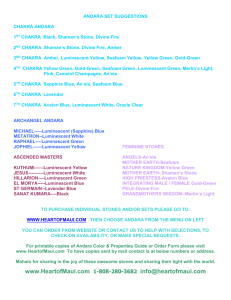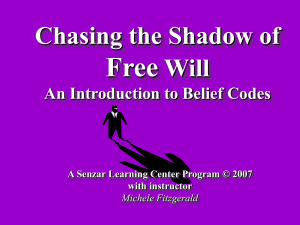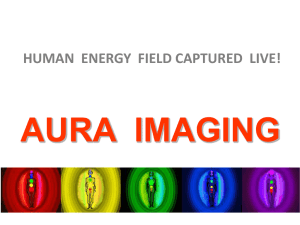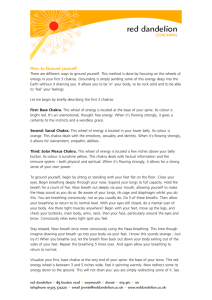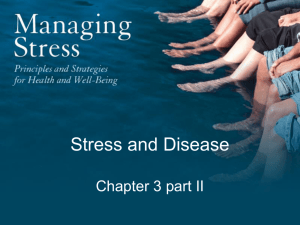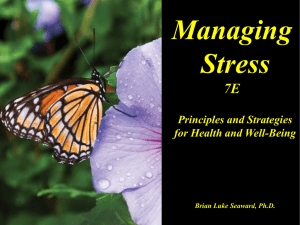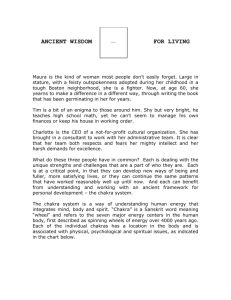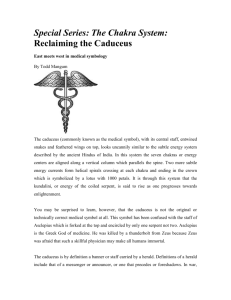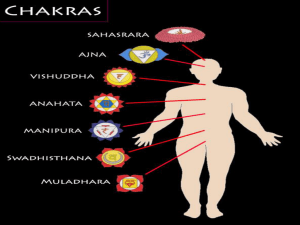Chakra’s 2 & 3 Today’s Agenda •Chakra 2– 3 Lec •Break
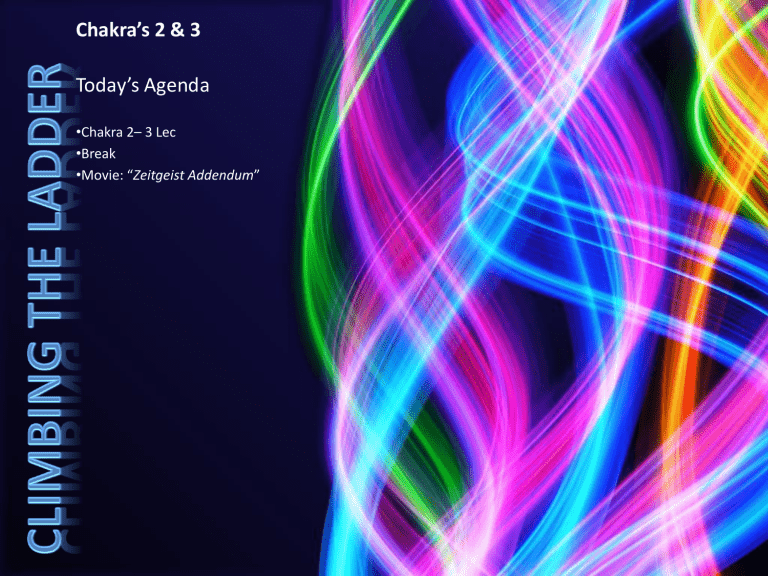
Chakra’s 2 & 3
Today’s Agenda
• Chakra 2– 3 Lec
• Break
• Movie: “Zeitgeist Addendum”
• What have we left behind?
• Is it madness or is Grace?
• How much Pure Spirit do we leave behind when “fully” embody an egoic consciousness?
Short Group Exercise
• In groups of 4 or 5, discuss amongst yourself what perfect liberty means to you?
• What perhaps did you leave behind between the ages of 2 to 3?
• Share with class.
•
• Short Clip
2
nd
and 3
rd
Chakra
Typhonic Self: Object Constancy, Eight Characteristics
• A child who cannot master object constancy grows up with a fluid sense of reality and vague paranoid feeling that things are not as they seem
1.
Fledging Self (attracted to self-objects and ground)
2.
Self identified with physical body (not yet located in head)
3.
Self-boundaries shared with parents (less so than 1 st chakra)
4.
I-ness becoming less permeable
5.
Cognitive life dominated by emotions
6.
Fantasy life intermixed with consensual reality
7.
Sense of time beginning to shape and form
8.
Logical system (cause and effect) developing
Emerging from Phantasmyia
• Choosing Regression or Repression
• Regression :
I.
Ego doesn’t grow
II.
Ego eventually grows, but their is a predisposition built toward
“psychosis” in later life
• Repression:
I.
Ego grows, paving way for re-emersion in ground in later life
Temporary Victory
• The repressed power of the ground does not simply disappear, however....
• It rather becomes confined in the lower abdomen, pelvis and genitals.
• Hence, self finds safe haven in the mental space associated with the head.
• In turn, due to socialization process and ego development, the self then further splits, and identifies with ego.
• Disowning Ground
A Necessity
• Transcending Ego “necessary to have ego”...?
• Ultimately, this sealing off prepares us for emersion in Chakra
3.
• But we need to be careful to not completely constrict, and yet, the seal has to be strong enough to ward of regression into psychosis during adolescence / early adulthood...
... Before we begin the conscious journey of returning/reremembering surrendering to the divine.
Withered or Watered Petals
Svadhisthana and it effects on Adulthood...
The Emotional Chakra
• Spiritual Function
• Create reality
• Seeing in and through emotion
• Only by staying in touch with our feelings can we truly know our soul’s desire or what it is revealing to us.
The Sexual and Sensual Chakra
• Sexual Wounding
• Sexual Exploitation
• Fear of Sexuality and Sensuality
• Denial of Pleasure
• Denial of Desire
The latter lead to soul wounding and disconnection or energy that is pushed into the shadow.
Sexual Trauma and Chakra Dysfunction
• When the chakras are functioning in a healthy manner, they open and close like a vegetable steamer in a fluid, unobstructed manner, at a moment’s notice, at our will.
• When they become damaged or blocked, they either do not open much at all, are stuck wide open or only open a percentage of what they can normally open.
Excess
• Excess / wide open Chakra
• Sexual promiscuity
• Sexual acting out
• Sexual addiction
• Re-experience to balance chakra
• All in all addicted to energy or enticed by…
Deficiency / Closed Chakra
• Emotionally cut off from ground / closed to feelings
• Sex is job / avoid pleasure
• Shame of sex / connection to others
• Restricted rigid body
• Alienation of body / hate for body
• Social exclusion / anxiety
Dancing with the Shadow
• What is the Shadow?
A) The shadow represents those characteristics and tendencies in our personalities, which the conscious ego is unwilling to acknowledge and accept as being part of itself. Moreover, and for the most part, these are the dark impulses in us that are somewhat ingrained. They also tend to have an earthly remnant and are painful to bare and especially hard to take responsibility for.
B) However, we cannot simply equate shadow with that which is absolutely negative or evil. It is only the “negative” of the image that we make of ourselves and that image is often linked to experiences in early childhood. http://vids.myspace.com/index.cfm?fuseaction=vids.individual&videoid=5214057
Reclaiming the Shadow
• Reclaiming the shadow dissolves judgment
• Brings greater acceptance of self and other
• Restore essential wholeness
• Ultimately, reclaiming the shadow means that we reclaim the instinctual energies of our needs and desires to that they can be channelled in appropriate ways .
• Thus, bringing the shadow into consciousness and claiming our right to feel.
Power and Will
• The world of ego
• The ground is sealed off
• The inner and outer world
• Self / Other = Me, I,
• “I” against “You”
Power and Will (contd)
• We think power is gained by fighting our inferior parts with the strength of our superior parts. If the right side wins, then we have a sense of power. If we lose, we feel powerless. We are asked to exert mind over matter, to prove our strength by dominating our basic instincts, suppressing the raw energy of the core self, which is the psychic source of our power.
Struggle itself becomes the focus of our life force .
Judith (1996).
Moving from Safety to Destiny
• Power is not created from staying safe; power comes from the willingness to leave the world of safety and move forward into the unknown.
• We are talking about autonomy here!
Autonomy
• Seeing ourselves as separate beings
• Taking responsibility for our lives
• Beyond blame
• Finding ourselves in the world, beyond culture, family, friends.
i
The Way of Individuation
• The individuation process is a psychological development that includes two monumental tasks .
• The first is intended to help people to distinguish or identify and fulfill their own unique potentials.
• This process involves differentiating the self from one’s constraints, which grew out of the conditioning process that has been imposed by family, peers, friends, schools, and other external influences.
• The second task is the requirement of an individual to differentiate himself or herself from their environments.
• The individuation process begins when we begin to ask ourselves these types of questions: “How I am a part of that which surrounds me?” “How am I different,” or
“What is I, and what is not I?”
3
rd
Chakra Excess
• Collectively this Excess can be seen right now!
• Materialistic society based on hedonism
• Escape from the present moment
• Doing and becoming recognized about all else
• Lionization of ego identity and its pursuits “false self”
• Who are our heroes?
3
rd
Chakra Excess
• Domineering control personalities (underneath frail ego)
• Bullies / Angry persons / inflated sense of self
• Ultimately the third chakra is “too open”, life energy is trapped cannot travel to other areas
3
rd
Chakra Deficiency
• Energy is not circulating caught in chakra two or one
• These folks tend to lack spontaneity, fire, vitality
• Easily manipulated by others
3
rd
Chakra Deficiency (contd)
• Depression is frequent
• Chronic fatigue (non and paradoxical)
• Intellect is dull
• Lack of outward aggression
What the energy does…
• Fear (1 st chakra) contracts energy at the base, guilt (2 nd chakra), restricts movement, while the energy that does move is bound by shame.
• Meanwhile, the upper chakra’s energy may be excessive. As the need for love is powerful, pulling energy up to help balance the third chakra.
• However, due to blockage and gravitational pull , the idea of love is mixed up (with sex, codependent relationships, ect) however, these eventually fail, thereby constricting energy and ego falls back on its own inadequacy.
Deficiency / Excess: Addiction
• Either deficient or excess may provide an affinity for stimulants like caffeine, amphetamines, or cocaine.
• Stimulants appear to help deficient system feel normal and the excessive system to continue constant activity.
• Chakra then be overly open and overly closed intermittently.
• Ultimately, we need to realize that behaviors attempt to deal with underlying soul wounds.
Movie-Time
“Zeitgeist Addendum”
• Inquiry questions…
• Reactions
• Feelings
• Thoughts
• Value of the show
